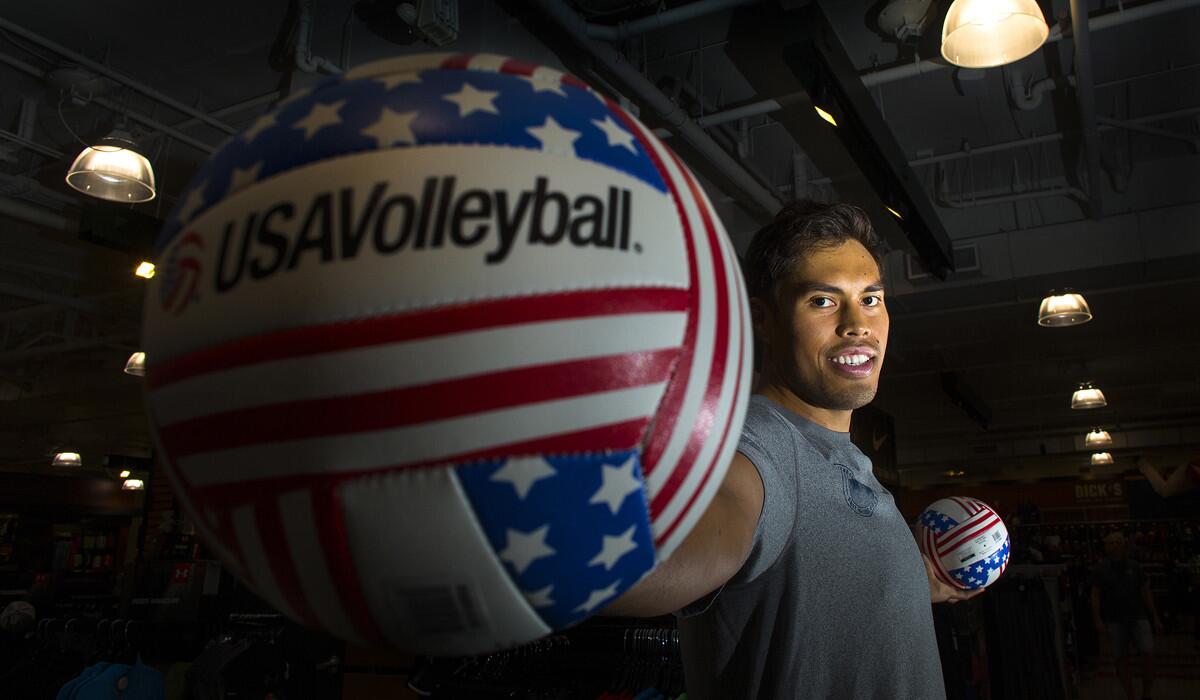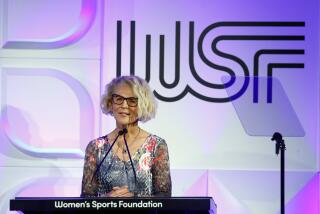Job program helps volleyball player Futi Tavana pursue Olympic hopes

U.S. men’s indoor volleyball team member Futi Tavana is training hard to come back from injuries and also works several shifts a week at Dick’s Sporting Goods.
- Share via
The blue swimsuit looked like a scrap of fabric in Futi Tavana’s hands, but he carried it carefully from the front register of Dick’s Sporting Goods in Newport Beach, where it had been left by an indecisive shopper, and restores it to its place on the sales floor. A few moments earlier, he had seen a box containing a volleyball jutting in front of its brethren on a shelf and tapped it back in line.
“I like things tidy, and I want it to look nice,” he said. “I have definitely gained greater appreciation for people who work in retail. If I go in a store and try something on, I’ll make sure I put it back.”
Tavana, a middle blocker on the U.S. men’s volleyball team, has become invested in his job. The investment is mutual, and mutually beneficial.
Through Dick’s Contenders program, which employs and equips aspiring Olympians and Paralympians, Tavana has been working while training to earn a spot on Team USA at the Rio de Janeiro Olympics. He’s among 200 athletes in the program, employed in 82 stores across 32 states.
“The customers like talking to an associate who is trained in sports and has that experience,” said DeAnna Holland, who is the community marketing manager for Los Angeles for Dick’s and oversees several stores that employ Olympians and Paralympians.
“It’s great to align them with their individual departments or with the team sports as a whole because they can speak to what’s the best volleyball, what’s the best soccer gear, versus someone who has never played the sport before and doesn’t really have that passion or that experience to really want to help your kid or help an adult be the best they can be.”
The job is a necessity for many participants because endorsements or lucrative professional contracts are rare outside of the most glamorous sports. Tavana, 28, has played pro volleyball in Italy, France and Indonesia but had to skip this season while recovering from knee surgery. In addition, he and his wife, 2012 U.S. women’s water polo gold medalist Tumua Anae, are parents of an 8-month-old daughter, Olive. The rent on their one-bedroom home in Costa Mesa is higher than the mortgage on his parents’ home in Utah, he said, but they’re near relatives and in a place where he can pursue his Olympic hopes.
“It’s been a huge blessing,” he said of his job, pausing between a morning practice in Anaheim and his Wednesday afternoon shift at Dick’s. “It takes a little bit of the financial burden off of me, to be able to support my family and try to live out my dream.”
Tavana, a native of New Zealand, grew up in Samoa and went to high school in Hawaii before attending Brigham Young. He became a U.S. citizen during his senior year in college, when he was invited to train with the U.S. team.
“I came in and I was basically just their practice dummy. They beat up on me in practice,” he said. “It was a great experience. I had no plans on even being invited. I wasn’t planning on playing volleyball past college.”
He has been involved in the Contenders program since September and works about 20 hours per week, the average for participating athletes.
“It’s kind of hard to get a little bit more than that if you’re training full time,” he said, “but they’re pretty generous about letting us work more if we are able to.”
Tavana wore warmup pants and a Contenders T-shirt that had “Grit Before Gold” written on the back. Like his fellow associates, he wears a tag that lists his name, his department — team sports — and, under the heading “My Passion Is,” the word volleyball.
“They put that on there. I was going to say chess,” he said, jokingly.
He gets assignments from his manager but likes to walk around to chat with customers. Often they find him; at 6 feet 8 he’s easy to spot. On a slow afternoon, he helped a young boy with batting gloves and advised a girl about a softball glove. When he couldn’t find a jacket a woman wanted, he made sure to ask if it was in stock. He didn’t know anything about lacrosse when he began but learned where to replace a pair of stray gloves.
“This is the section I avoided. Now I’m on top of it,” he said.
He enjoys the work, but it takes a toll.
“I’m not used to standing. My first day on the job, I got home and I think I was more sore than I have ever been playing volleyball,” he said.
But he’s thankful for the work, which provides sustenance for his family and a chance for him to match his wife’s golden feat.
“I said, ‘This is a family medal, right?’ She said, ‘No, you have to get your own. I worked hard for that one,’ ” he said, laughing.
His work continues, in the store and in the gym.
More to Read
Go beyond the scoreboard
Get the latest on L.A.'s teams in the daily Sports Report newsletter.
You may occasionally receive promotional content from the Los Angeles Times.










